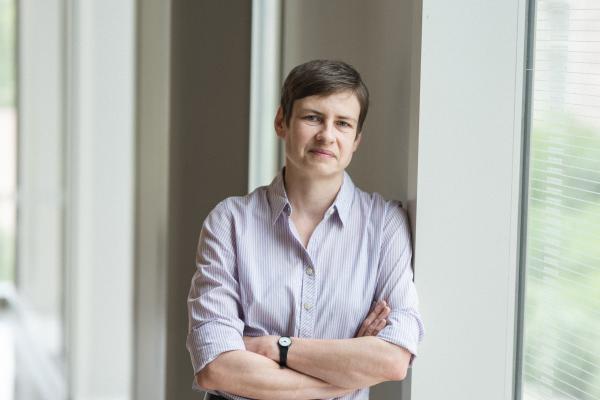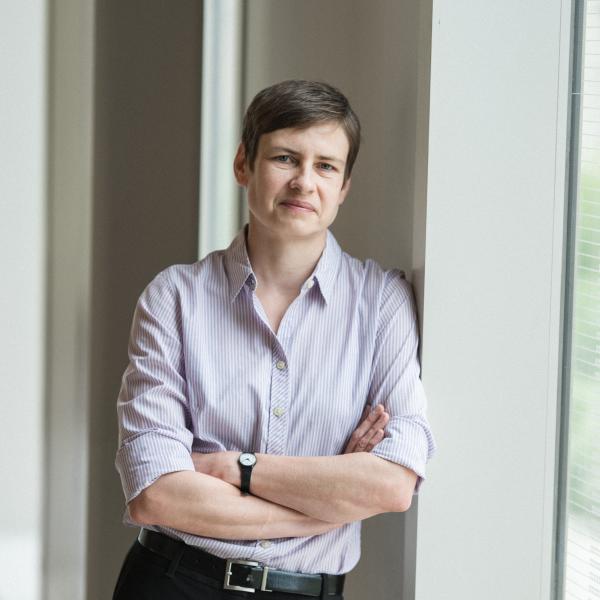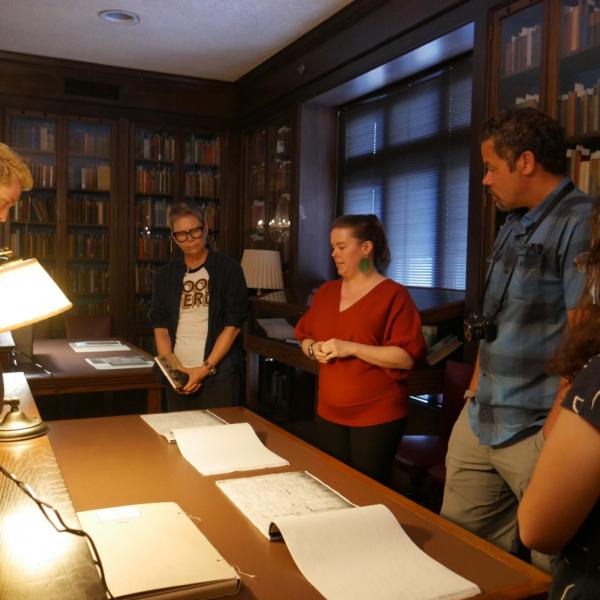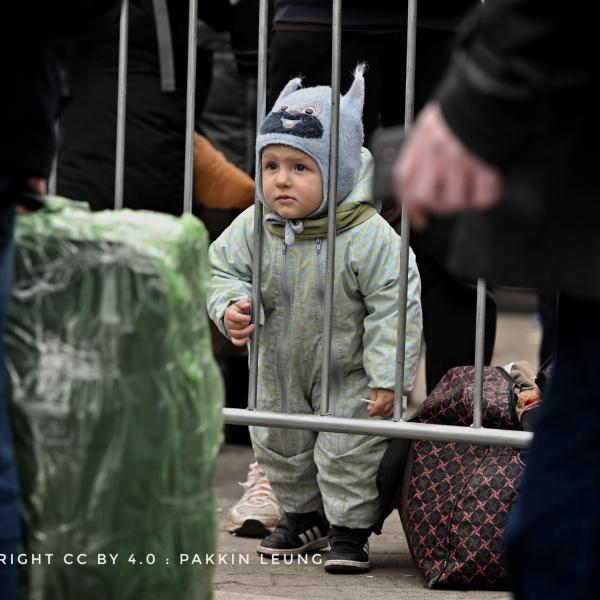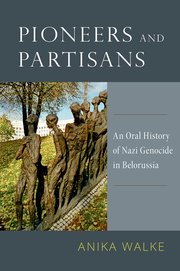Selected Publications
Blog Posts
“Old and New Faultlines in the Wake of Russia’s Assault on Ukraine”, The New Fascism Syllabus, 11 March 2022
"'Your heart is a muscle the size of your fist': The promise of the Belarusian protest movement", ZeitgescichteOnline, 22 September 2020
"The Fall of the Berln Wall and the Political Movement Overlooked by 30th Anniversary Celebrations," Washington University in St. Louis Center for Humanities
Follow the blog postings of the FOCUS (aka Ampersand) Program “The History, Memory, and Representation of the Holocaust." There, you are able to learn about our study trip through Germany, Poland, and Lithuania.
Books
Pioneers and Partisans: An Oral History of Nazi Genocide in Belorussia (Oxford University Press, 2015).
Jüdische Partisaninnen. Der verschwiegene Widerstand in der Sowjetunion (Berlin: Dietz, 2007)
Edited Volume
Migration and Mobility in the Modern Age: Refugees, Travelers, and Traffickers in Europe and Eurasia. Ed. by Anika Walke, Jan Musekamp, and Nicole Svobodny (Indiana University Press, 2017)
Peer-Reviewed Articles
“Testimony in Place: Witnessing the Holocaust in Belarus,” East European Jewish Affairs 52, no. 3 (2023): in press; Russian translation to be published in Novoe Literaturnoe Obozrenie.
“A People’s Biography: Ada El’evna Raichonak and Her Hermanavichy,” Autobiografia: Literatura/ Kultura/ Media 14, no. 1 (2020): 123-144.
“Historische Orte als Chiffre: Protestbewegung und Erinnerungskultur in Belarus,“ Osteuropa 70, no. 10-11 (2020): 385-398.
Anne Kelly Knowles, Justus Hillebrand, with Paul B. Jaskot and Anika Walke, “Integrative, Interdisciplinary Database Design for the Spatial Humanities: The Case of the Holocaust Ghettos Project,” International Journal of Humanities and Arts Computing 14, no. 1-2 (2020): 64-80.
“’To Speak for Those Who Cannot’: Masha Rol’nikaite on Anti-Jewish and Sexual Violence during the German Occupation of Soviet Territories.” Jewish History 33, no. 1-2 (2020): 215-244.
“Split Memory: The Geography of Holocaust Memory and Amnesia in Belarus.” Slavic Review 77, no.1 (2018): 174-197.
“Jewish Youth in the Minsk Ghetto: How Age and Gender Mattered,” Kritika–Explorations in Russian and Eurasian History 15, no. 3 (2014): 1-28.
“Memories of an Unfulfilled Promise: Internationalism and Patriotism in Post-Soviet Oral Histories of Jewish Survivors of the Nazi genocide,” Oral History Review 40, no 2 (2013): 271-98.
“Pamiat’, Gender, i Molchanie: Ustnaia Istoria v (Post-) Sovetskoi Rossii i Prizrachnaia Gran’ mezhdu Privatnym i Publichnym” (in Russian, Engl.: “Memory, Gender, Silence: Oral history in (Post-) Soviet Russia and the Blurry Line Between the Public and the Private”). Laboratorium: Zhurnal Sotsialnykh Issledovanii (St. Petersburg, Russia) 1 (2011): 72-95.
“Remembering and Recuperation: Memory Work in the Post-Soviet Context.” Zeitgeschichte (Vienna, Austria) 36.2 (2009): 67-87.
Recent Book Chapters
“’There was no work, we worked only for the Germans’: Ghettos and ghetto labor in the German-occupied Soviet territories.” The Ghetto in Global History, 1500 to the Present Ed. Wendy Z. Goldman and Joe William Trotter, Jr. London: Routledge, 2017, 93-109.
“Introduction” to Michael Kutz, If, By Miracle (The Azrieli Series of Holocaust Survivor Memoirs) (Toronto: Azrieli Foundation, 2013).
„Wir haben über dieses Thema nie gesprochen.’ Jüdischer Überlebenskampf und sowjetische Kriegserinnerung.“ Umdeuten, verschweigen, erinnern: Die späte Aufarbeitung des Holocaust in Osteuropa. Eds. Micha Brumlik and Karol Sauerland. Frankfurt/M: Campus, 2010, 25-46.
“’It wasn’t that bad in the ghetto, was it?’ – Living On in the USSR after the Nazi Genocide.” Survivors of Nazi Persecution in Europe after the Second World War: Landscapes after Battle Vol. I. Eds. Suzanne Bardgett, David Cesarani, Jessica Reinisch, and J.D. Steinert. London: Vallentine Mitchell, 2010, 218-36.
In the Media
Memory studies beyond the classroom, Washington University in St. Louis --The Ampersand, 5 December 2022
The Children's Hell of Minsk, Tablet, 25 October 2020
Eine Frage des Framings,, die tageszeitung, Berlin (Germany), 4 July 2019
Scholars Push Back on Holocaust Museum’s Rejection of Historical Analogy, Chronicle of Higher Education, 3 July 2019
An Open Letter to the Director of the US Holocaust Memorial Museum, 1 July 2019
WashU Expert: Defining ‘concentration camps’, Washington University in St. Louis --the source, 28 June 2019
New Books Network, interview about Pioneers and Partisans: An Oral History of Nazi Genocide in Belorussia, May 2018
Impact in Profile. USC Shoah Foundation – The Institute for Visual History and Education. October 2017
“Z’vestki pra belorusoŭ-saŭdzel’nikaŭ galakostu ŭ arkhivakh KDB. A iany zakrytyia” – Aŭtarka knigi pra genatsyd u Belarusi” (Interview on state of Holocaust memory and scholarship, in Russian/ Belarusian). Radio Svoboda (Belarus), July 5, 2016.
Interview with Prof. Jay Winter (Yale University) for Hold That Thought: Explore a World of Ideas. Podcast Series of Arts & Sciences, Washington University in St. Louis, January 27, 2015.
“When everywhere is a grave: remembering WWII casualties in Belarus.” Oxford University Press Blog, Sep 20, 2015.
“Nikto ne znal o moem sushchestvovanii: Molodye sovetskie evrei v istorii i pamiatii natsistskogo genotsida (Nobody knew about my existence: Young Soviet Jews in the History and Memory of the Nazi Genocide),” lecture for Evropeiskoe kafe: Otkrytie lektsii i diskussii (Series European Café: Lectures and Discussions), Brest (Belarus), Kryly Halopa Theater, May 18, 2015.
Prizes and Awards
2015 Heldt Prize of the Association for Women in Slavic Studies for Best Article in Slavic and East European Women’s Studies for “Jewish Youth in the Minsk Ghetto: How Age and Gender Mattered,” Kritika–Explorations in Russian and Eurasian History 15, no. 3 (2014): 535-62.
2004 The Hadassah-Brandeis Institute Junior Research Award for the publication project “Life Stories of Soviet Jewish Women Surviving the Holocaust” (in German), resulting in Jüdische Partisaninnen. Der verschwiegene Widerstand in der Sowjetunion. Berlin: Dietz, 2007.
Fellowships and Grants
2018-21 Joint recipient of NEH Digital Humanities Advancement Grant for “The Holocaust Ghettos Project: Reintegrating Victims and Perpetrators through Places and Events,” PI: Anne Knowles (University of Maine), Co-PIs Paul Jaskot (Duke University) and Anika Walke. Read more about the grant in The Ampersand.
2018 Faculty Fellowship, Center for Humanities, Washington University in St. Louis. Spring.
2017 NEH Summer Institute “Space, Place, and the Humanities,” Northeastern University, Boston, MA.
2015 with Erin McGlothlin: Teaching Grant of the Holocaust Educational Foundation to support the FOCUS First-year program “The History, Memory, and Representation of the Holocaust.”
2011-14 Postdoctoral Fellowship, International and Area Studies, Washington University in St. Louis.
2013 Postdoctoral Research Fellowship, German Historical Institute Moscow, two months.
2012 Stipend for Jack and Anita Hess Faculty Seminar “Holocaust Geographies: An Interdisciplinary Approach to Teaching about the Holocaust.” US Holocaust Memorial Museum, Washington D.C. January.
2011 Thesis Fellowship of the Fondation pour la Mémoire de la Shoah, Paris (France). AY 2010/11. Declined, re-awarded for summer 2011.
2010-11 Chancellor’s Dissertation-Year Fellowship, UC Santa Cruz. AY 2010/11.
2010 Research Fellowship of the Miles Lerman Center for the Study of Jewish Resistance at the Center for Advanced Holocaust Studies, US Holocaust Memorial Museum, seven months.
Recent Courses
The Holocaust: A European Experience, part of the Ampersand program “The History, Memory, and Representation of the Holocaust”
The Holocaust: History and Memory of the Nazi genocide
War, Genocide, and Gender in Modern Europe
Gender, Sexuality, and Communism in 20th Century Europe
Socialist and Secular? A Social History of the Soviet Union
Modern European History: Migrations, Nation States, Identities
Migration and Modernity: Human Mobility, Identity, and State Formation in Russia and the (former) USSR
Migration and the Nazi Genocide

